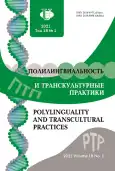Русский язык в Казахстане: особенности обучения и функционирования в контексте межъязыкового взаимодействия
- Авторы: Журавлёва Е.А.1, Агманова А.Е.2
-
Учреждения:
- Евразийский национальный университет имени Л.Н. Гумилёва
- Павлодарский педагогический университет
- Выпуск: Том 18, № 1 (2021)
- Страницы: 20-28
- Раздел: Языковые контакты
- URL: https://journal-vniispk.ru/2618-897X/article/view/326628
- DOI: https://doi.org/10.22363/2618-897X-2021-18-1-20-28
- ID: 326628
Цитировать
Полный текст
Аннотация
Многообразие и специфика культур и языков этносов, проживающих на территории Казахстана, создают особый социокультурный контекст евразийского пространства, демонстрируя модель современного межэтнического языкового и социокультурного взаимодействия. Своеобразие социально-коммуникативного пространства страны, характеризующееся доминированием государственного казахского и русского языков - языков двух крупных этнических групп - на фоне большого языкового разнообразия, определяет значимость изучения их взаимодействия и взаимовлияния в контексте мультикультурного общества. В статье анализируются вопросы языкового взаимодействия в полиэтническом государстве, формы и методы воздействия иностранного языка на русский язык. Рассмотрены вопросы изучения и функционирования русского языка как родного и как второго. Активные процессы, обусловленные особенностями взаимодействия казахского и русского языков, анализируются как речевая деятельность этнических русских; русская речь других этносов; изучение и использование русского языка репатриантами-казахами и иностранными гражданами.
Об авторах
Евгения Александровна Журавлёва
Евразийский национальный университет имени Л.Н. Гумилёва
Автор, ответственный за переписку.
Email: zhuravleva_ea@enu.kz
доктор филологических наук, профессор, зав. кафедрой теоретической и прикладной лингвистики филологического факультета
Республика Казахстан, 010008, Нур-Султан, ул. Сатпаева, 2Атиркуль Егембердиевна Агманова
Павлодарский педагогический университет
Email: agmanova@mail.ru
доктор филологических наук, профессор, профессор Высшей школы гуманитарных наук
Республика Казахстан, 140003, Павлодар, ул. Мира, 60Список литературы
- Dave, B. & Sinnott, P. 2002. Demographic and Language Politics in the 1999 Kazakhstan Census. Watson Institute, Brown University, the National Council for Eurasian and East European Research. Pp. 5-8. Print.
- Prokhorov, Yu.E. 2005. “Russkii yazyk v novom kommunikativnom prostranstve XXI veka”. In Sostoyanie russkogo yazyka i prepodavanie na russkom yazyke za predelami Rossii. Vozmozhnosti ispol’zovaniya mezhdunarodnogo opyta: Collection of abstracts of Research-Practical Conference. Kishinev: VALINEX. Print. (In Russ.)
- Mirzoyan, S.V. 2003. “Adaptacija zaimstvovannyh slov”. History of linguistics, literature study and journalism as the basis of modern philological knowledge. Volume 2. History. Culture. Language: 108. (In Russ.)
- Agmanova, A.E. 2018. “Specifika jazykovoj podgotovki studentov kazahov-repatriantov”. In Russkij jazyk i literatura v tjurkojazychnom mire: sovremennye koncepcii i tehnologii: Collection of abstracts of Research-Practical Conference (Kazan’, November, 29 - December, 1, 2018). In 2 volumes. Edited by d. R.R. Zamaletdinova, T. G. Bochina, Yu. V. Ageeva. Kazan: Kazan University Publishing House, 2018. Vol. 1. Pp. 17-21. Print. (In Russ.).
- Zhuravleva, E. 2016. “Trends in the Formation of Kazakhstan’s Variety of Russian”. In Pluricentric Languages and Non-Dominant Varieties. Worldwide: Volume 1: Pluricentric Languages across Continents Features and Usage. Frankfurt a.M. / Wien u.a., Peter Lang Verlag. Print.
Дополнительные файлы









